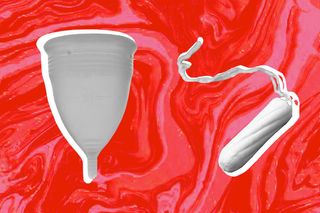
A Cultural Obsession With Virginity Is Keeping Women from Using Menstrual Cups, Tampons
A tampon is not a penis.

In a small NGO tucked inside a narrow by-lane behind the hustle bustle of Delhi’s ITO, Cynthia Kumar tells the women in the office, “Didi is here to ask about the cups. Don’t be shy.” While the NGO recently distributed menstrual cups among local women, the subject of managing their periods and the mention of vaginas was still a cause for nervous giggles within the office.
The conversations around menstrual equity and menstrual hygiene products in India are inextricably linked with the questions of privacy, access, and morality. And these pervasive cultural conceptions are working to the detriment of women’s health. Specifically, our obsession with virginity may be making it harder for more women to use products like menstrual cups and tampons. There’s a strong argument to be made in favour of menstrual cups, which are expensive, but environmentally sustainable and allow a woman far greater freedom of movement than any other sanitary product. For our ill-conceived conservatism to get in the way of women having more options for themselves is abysmal.
“My mother won’t let me,” says 18-year-old Farheen Idrisi. A first-year arts student, Idrisi comes from a conservative family. She says her mother will never allow her to use any product that involves insertion into a vagina before her marriage.
“Men have no shame about losing their virginity. They go strutting about. Why should we feel shame,” she says. Other women who have joined the conversation nod fervently. Kumar tries to explain to the women that sexual activity has nothing to do with moral character. One woman, who does not want to be named, is clearly uneasy. “I believe it’s important not to have sex before marriage, applicable for both men and women,” she says.
Menstrual hygiene has nothing to do with sexual activity. However, in India, where a community is fighting to stop the white bedsheet virginity test to determine a bride’s purity, and rape survivors still have to prove their violation through the two-finger medical test, it’s not surprising that moral policing around virginity becomes a determinant of menstrual hygiene options. Along with the cup, tampons have also gotten a bad rap in India. While they have been available, they have remained invisible outside of pharmacies and online retailers. Neither abundantly available in small towns, nor advertised in popular media despite their cost-competitiveness, one can conclude that India’s discomfort around women’s bodies are a major factor in these products unfavorability.
***
Much of the hesitation that health workers anticipate about women taking to cups or tampons before marriage is based on preconceived notions about how each societal class perceives morality, says Suparnaa Chadda, who runs We – Women Endangered and regularly promotes cups. Chadda says she had gone to a menstrual advocacy drive in Patparganj in East Delhi with the understanding that the women under 18 will not show any interest in cups. “But I was told by the coordinator that girls in slums reach sexual activity much faster than their counterparts in high income families. Girls of 15 and 16 took home the cups. There was keen interest.”
She hesitates to take cups to schools fearing skittishness from authorities about a menstrual product that involves vaginal insertion and possible parental disapprobation. Sex education isn’t compulsory in Indian schools and as a result misconceptions about reproductive health and a discomfort with their own bodies is rampant among the young.
There needs to be more open conversations about women’s bodies, Chadda feels. “A huge part of the barrier is mental. I, an educated person, balked at the thought of touching my vagina during periods to insert the cup, so I can imagine what those without much awareness about their bodies would feel.”
In her novel ‘Chup: Breaking the silence about India’s women,’ author Deepa Narayan writes about women’s uneasy relationship with their bodies in India’s crowded middle class homes with shared bathrooms, constricted sleeping spaces and complete lack of privacy. The missing intimacy manifests as lack of ownership over their own bodies. At a cup distribution programme in Harola, Noida, a woman, a mother of three, asks: “But…if I wear a cup, won’t it fill with urine?”
While these issues are pervasive in India, we are also witnessing a weakening of the influence of the glorification of virginity and certain signs of change.
Malini Parmar, 46, co-founder of Stonesoup, one of the makers of menstrual cups in India, says mothers in urban, upper middle class households are less worried about their daughters losing their virginity and more about the discomfiture cups or tampons might cause because they involve vaginal insertion.
But given the choice themselves, Parmar finds that girls in colleges (in their late teens and 20s) from different economic backgrounds are much more aware about their menstrual rights and bodily independence – due to better access to information and money ‑ as compared to girls in schools (early teens) whose parents control their choices.
Once she began selling menstrual cups, however, Parmar also realised she had to change her assumptions about women’s agency, especially with regards to women in the hinterlands.
“Our target was the 25-45, well-read, globally-travelled, upper middle class demographic earning more than a lakh per month. But we found customers across the spectrum when we started selling,” she says about the Stonesoup ‘She’ cups that cost about Rs 1000 and comes in a fits-all standard size. They sell about 500-600 cups a month and now have 75 partners across India in places such as Dharwad, Coimbatore, Aurangabad, Bhubaneswar and Chennai marketing the cups.
While there are several challenges for menstrual cups being used, from the reluctance of retailers to stock a product that would generate less revenue (because they last 5-8 years), to the market being flooded with low cost imitations that don’t hold up to the quality checks required, our cultural hang-ups prove to be one of the biggest hurdles.
Rituparna Chatterjee has been a journalist for over 15 years, starting her career with the Statesman newspaper in Delhi. She has worked across media platforms, in news agencies, websites and magazines. She was part of the team that founded HuffPost in India and has served as its Deputy Editor and acting Editor in Chief. She is the India correspondent for international media freedom watchdog Reporters Without Borders and writes on press freedom, gender rights, and social disparity.
Related


Fear Of ‘What Will People Say?’ Is Driving Up India’s Suicide Rate
